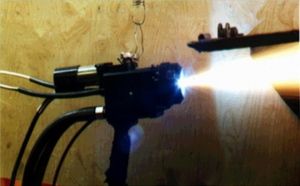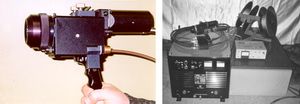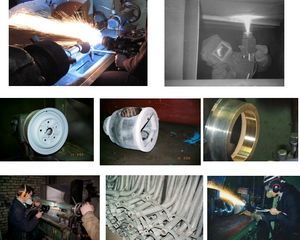Main Sector of relevance\IRC classification 8. Industrial Manufacturing, Material and Transport Technologies
8.46 Technologies and equipment for application of protecting, wear-resistant coatings using gas-thermal methods: 1. hypersonic metallization (equipment and technologies)
Developers’ contact information
State Scientific Institution “Joint Institute of Mechanical
Engineering of the National Academy of Sciences of Belarus”
12, Akademicheskaya Str., Minsk 220072
Tel/fax: +375 (17) 210-07-49; Web-site:
http://oim.by
Summary
—
Description
The developed technology and equipment for hypersonic metallization (HM) allow applying to parts wear-resistant coatings with enhanced cohesive resistance, able to sustain high contacting loads at shock stress. Hypersonic metallization unites advantages of the well-known coatings applying techniques – electric arc metallization and high-speed gas-flame spraying. The distinctive feature of a HM-unit is availability of a small-sized propane-air combustor. Combustion products form a supersonic jet flow at the nozzle’s outlet. This jet flow speed makes over 1500 m/s at 2200 K (Fig. 1).

Fig. 1 – HM-unit with a small-sized combustor.
Application of coatings via steel wires spraying
Technical characteristics:
applied wire diameter – 1,5…2,2 mm; maximum operating current - 380 A; air
consumption - 60 m3/h; propane-butane consumption – 0.09 kg/h;
dimensions – 290×255×75 мм; weight of the unit – 3.1 kg; performance
with wire diameter 2 mm, kg/h: steel – 18.4, aluminum – 6.5, zinc – 16.8.
For HM it is possible to apply wires of various metals – zinc, aluminum,
bronze, copper, steel, nichrome, their combination as well as powder wires.
Advantages of a HM-unit
- reduction of oxidation of the sprayed material and burning-out of alloying
elements;
- high particle velocity of a sprayed material (up to 500 m/c);
- the jet angle does not exceed 10 degrees, herewith materials utilization rate
increase up to 0.85;
- steel coatings porosity 2–4%, density of aluminum alloys coatings
approaches density of cast metal.
The unit package includes a metallization apparatus, a control terminal and a
switching unit. A standard welding source with rigid “VDU-506”
characteristic has proved to be a good power source (Fig. 2).

Fig. 2 – HM-unit with power source “VDG-401”
Process and equipment for hypersonic metallization are used for (Fig. 3):
- renovation-hardening of well-worn cylindrical surfaces (spindles and axle
necks working in a pair with antifriction and slider bearings, brake
pulleys);
- renovation-hardening of flat parts (guide rails, friction circles);
- protection of parts, constructional elements and installations from
corrosion;
- making bimetallic “steel-bronze” pistons instead of all-bronze ones.

Fig. 3 – Process of applying coatings and parts with coatings
Technology type
Technical advantages and economic benefits
The technological process allows to save 15–20% of the metal that is used for repairing automotive machinery parts, reduce repair cost by 5–10%, lessen by 20–30% volumes of purchases from abroad, regarding expensive new parts of automotive machinery by prolonging operating life of the parts with the protective coatings by 1.8–3.5 times due to their numerous renovations during scheduled repairs.
Technology differentiation and uniqueness
—
Context in which technology was identified
The technologies and equipment for hypersonic metallization were presented in 2007 at exhibitions “MILEX-2007” (Minsk) and “Autotechexpo-2007” (Minsk).
Technological keywords
—
Development Stage
Intellectual property rights
Range of applications
General and agricultural machinery industry, transport, metallurgy, equipment for oil and gas transportation and refining.
Classifier Used at the EU Innovation Relay Centres
Preferable Regions
Practical experience
The Institute has practical experience of implementing HM-technology at miscellaneous industry branches enterprises.
Environmental impact
None.
Type of collaboration sought
Terms and restrictions
—
Available technical assistance